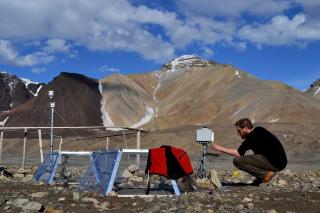
Activities of Czech scientists related to the Arctic
For many years, Czech representatives have participated in the activities of the International Arctic Science Committee (IASC), an advisory body to the Arctic Council.
Czech experts have also been actively involved in the work of the University of the Arctic (UArctic), the Forum of Arctic Research Operators (FARO), the Association of Polar Early Career Scientists (APECS), the International Science Initiative in the Russian Arctic (ISIRA), the US National Science Foundation (NSF), Arctic-FROST, the Arctic-FROST Network, the Interagency Arctic Research Policy Committee (IARPC), the International Network for Terrestrial Research and Monitoring in the Arctic (INTERACT), EU-PolarNet, and more. The Czech Republic wishes to support the work of the Arctic Council through partnerships and cooperation with its Members, Permanent Participants and Observers.
In 2017,the Czech Republic hosted the Arctic Science Summit Week (ASSW). The conference focused on three main areas for further Arctic research, all of which Czech scientists are involved in:
- • The Arctic is changing due to climate change but scientists still have very little understanding of this process at all levels, including “Arctic Greening”;
- • The Arctic is home to about 4 million inhabitants, including indigenous peoples, and their living conditions are changing so dramatically that science and research is needed to help respond to the many challenges;
- • Climate change in the Arctic offers great opportunities for improved methods of resource utilization (mining, fishing, ocean transport, etc.), and one of the most pressing global challenges in modern science is the development of bioprospecting and low-temperature biotechnology.
The Centre for Polar Ecology of the University of South Bohemia (CPE) organized several Polar Ecology conferences in 2012–2020. CPE intends to continue its involvement in such activities and to continue to help identify and solve the challenges connected with Arctic regions.
The University of South Bohemia in České Budějovice has concluded a Memorandum of Understanding with Université Laval (Canada) and the Agreement on Cooperation in Polar Research with the Japanese National Institute for Polar Research. Exploratory discussions have also been held with the University of St. Petersburg.
The University of South Bohemia in České Budějovice and Masaryk University in Brno, together with the Austrian Institute for Polar Research and the Polar Research Committee of the Polish Academy of Sciences, have formed the so-called “Central European Polar Partnership”. With respect to the activities of the Czech Research Station in Svalbard, the CPE maintains very close relations with the Norwegian Polar Institute, the University Centre in Svalbard (UNIS) and the Arctic University of Norway in Tromsø (UiT).
